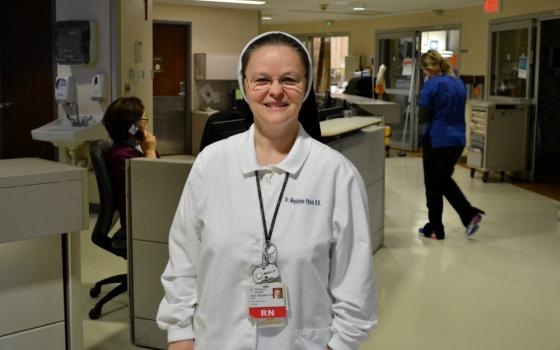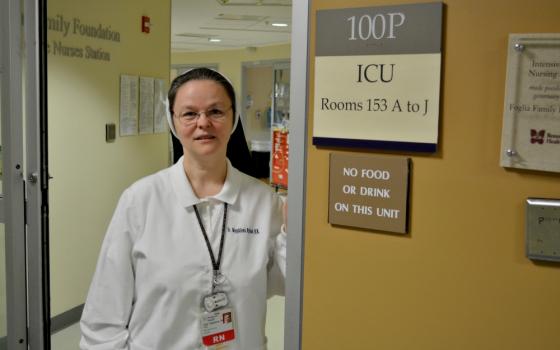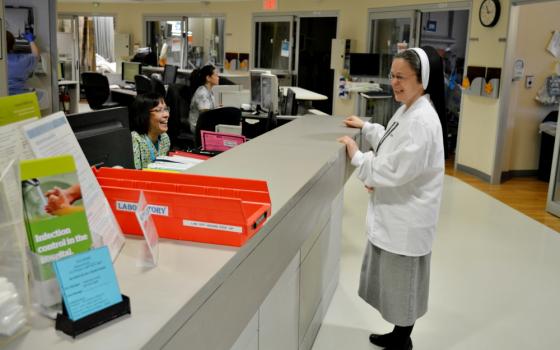Running an eight-bed intensive care unit at a long-term acute care facility in a northwest Chicago suburb has its ups and downs, Sr. Magdalena Rybak says. But the 42-year-old Sister of the Holy Family of Nazareth says it's all part of a calling that is alive and well more than 20 years after she entered religious life.
Rybak, who is from Poland, is a nurse in charge of the dialysis wing of the intensive care unit at Holy Family Medical Center in Des Plaines, Illinois, which is where she received her first assignment as a fully professed sister more than 14 years ago. She talked to Global Sisters Report about nursing, her life's passion.
GSR: You first completed your nursing degree, then you entered the congregation. How did the two converge?
Rybak: I truly believe that through nursing, I discovered my religious vocation. When I first started having experience in clinicals, the geriatric units, surgeries, pediatrics, I felt very, very strongly a calling to dedicate my life to people, to the service of people.
I was in my first two years of nursing school, but I felt a strong calling that just being a nurse was not enough. And I really attribute my nursing career to helping me discover my religious vocation. So nursing was my very first vocation.
I really didn't know the sisters. There was not much exposure in my community, in my parish, with the sisters. One day in 1993, I received a random letter from the Sisters of the Holy Family from Ostrzeszow, Poland, close to Kepno, my hometown, inviting me for a retreat.
My pastor said, "You should go."
I said, "Well, I have nothing else to do during the summer. I might go."
And once I went there, I knew that was where I wanted to be. I went to that convent every single month for the next three years until I finished my nursing school in June, and in August, I became a postulant.
You said with nursing, there is the care that you give — the medical attention, the compassion — but there's something deeper.
This is not just a regular job or profession that you can get trained for. It takes a lot more than that because you are meeting people, families, your co-workers in the most vulnerable times of their lives when you're trying to ease pain and suffering. And sometimes you have a very good outcome and you feel very good about your job and what you're doing, but sometimes you have to face the fact that there is only so much that you can do and face death. That aspect of life and death, it's very palpable in this ministry. If you have not touched or had the exposure of having deeper understanding of life and death, then you struggle.
There is such a great component of a spiritual meaning in nursing, how you talk to people, how you develop skills of not only hearing them but listening to them at the deeper level: why they are reacting the way they are, what they've been through. It takes a lot of empathy on your part and compassion and kindness.
In this rushed world of technology and electronics and busy time of communicating, of that instant gratification that we're so used to, there is a time that the only thing you can offer is just to be there for them and to listen. I say this with pride and also humility: It takes special people to do this job alone because you meet families and patients in their most difficult times in their lives, and you touch the places that they've never been to. They don't know how to react, so they seek guidance from you, a nurse. "What would you do?" "So what do I do now?" "Is it the right thing I'm doing?" Sometimes you don't have an answer.
I remember one daughter. Her mother died, and she asked me if I could help her with the personal care of her mother after her passing. I could see she was holding back tears. Her mother was elderly — she was in hospice care for a while — so I told her, "It's OK to cry."
She said, "Is it OK to feel that you're really never ready for the death of your loved one?"
I said, "That's how it is. No matter how much you tell yourself, 'It's coming. I know there will be a day, my mom is getting weaker, she's low right now,' but you're never ready."
That companionship that you can provide to patients and their families, that's very rewarding, and sometimes that's all you can do.
When do things become challenging?
I think the most difficult times I've had so far is when the family struggles to make a decision that is right for the patient and when we see that the care we are providing is futile. It's a poor prognosis or outcome, and we actually feel and know as health care professionals that we're doing more harm than good. However, the family cannot embrace that fact that there is nothing else you can do but provide comfort pain-free to the best of our abilities.
People say, "Why is there nothing else you can do? Why, in the 21st century, cannot you do more for my father, my mother? Why are you telling me that?"
We try to explain that there is only so much we can do. Naturally, the body, the mind, the spirit have limitations and can respond only to certain treatments and procedures with that or this outcome. Sometimes we have just no control over it. But what can we do for them is to make them feel better.
That's where the real struggle is: "Now it's time to focus on comfort care." Sometimes they do agree; sometimes they don't. And we struggle until the very last moment, the very last breath that the patient takes because the family just cannot make the decision.
How do you deal with that?
I always try to keep them in my thoughts, in my prayers, saying we have given them all the opportunities and resources to make that decision. What I try to tell myself and my staff is we just have to do our best to keep that patient as comfortable as we can and know that we are there for a reason, to be there for them, and advocate for them to the best of our abilities.
I try to be less angry as the years go by than I used to be at the very beginning. I put myself in their shoes and try to be calm and patient with myself and them and try to be transparent. I think they need to hear it and see what's going on, and I think sometimes that helps, too. And it's difficult. It's difficult for them to understand she's not getting better.
I can see how difficult that would be.
But I am fortunate and blessed to work with my manager and the group of people that are supporting each other. That's one of the ways I cope with it. We are all in this together, and you don't feel overwhelmed and crushed and burdened by yourself. You have a group of people who is behind you, who feels your pain.
Being a charge nurse, you have a reputation of running a tight ship and people love you.
Yes, it's been 14 years and they do know my expectations. Some of them do, and some of them are more critical and pessimistic. But I am a great advocate of transparency and clear communication. If there's anything that I have done that made you feel uncomfortable, if there's anything I do on a daily basis, then please tell me so I won't make that mistake again.
Because it's a small facility, we all know each other by name. Even if before you have not known me, you know me because I'm the only [sister who works full-time] here. It's that close-knit type of family relationship we have. That's what people like about it. I think I can speak for my department. It's that support we give to each other.
What are your thoughts for the future? Is your assignment to be here permanently? Or would you be possibly moved?
That's the unknown always of our religious needs and congregation because I never imagined myself coming here 15 years ago when I was asked. So that can always change. My congregation gave me the opportunity to come here, and I'm so passionate and in love with my ministry here. I want to continue this as long as I can.
[Simone Orendain is a freelance multimedia journalist who reports from the Chicago/Midwest area and Asia.]



